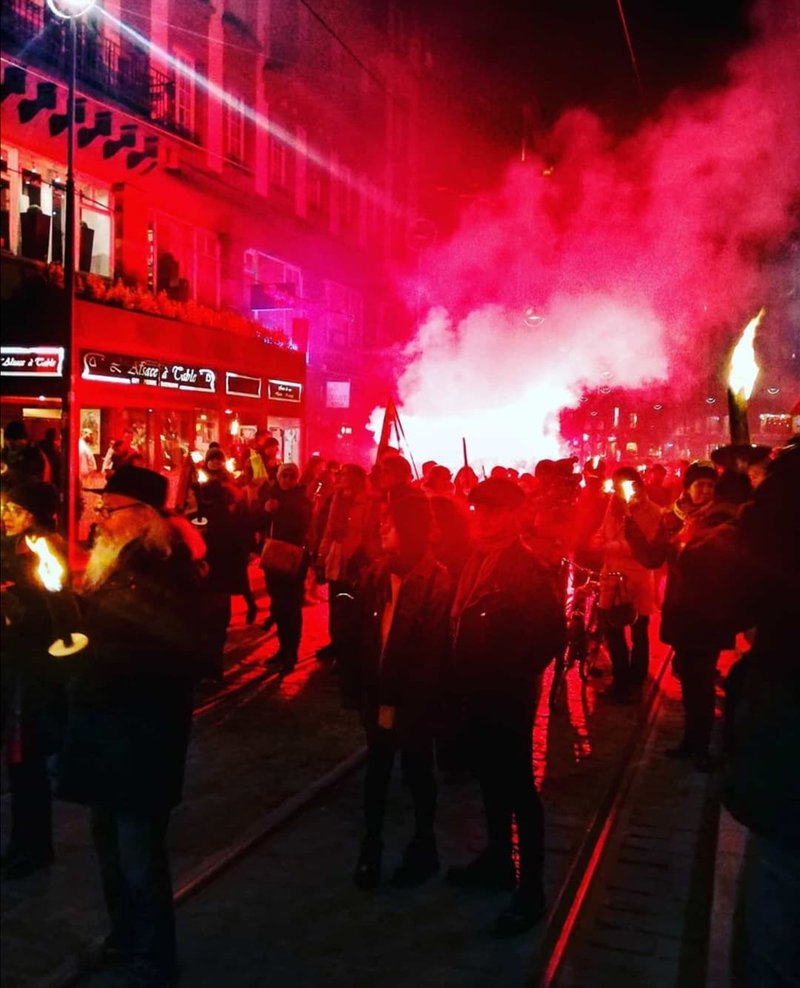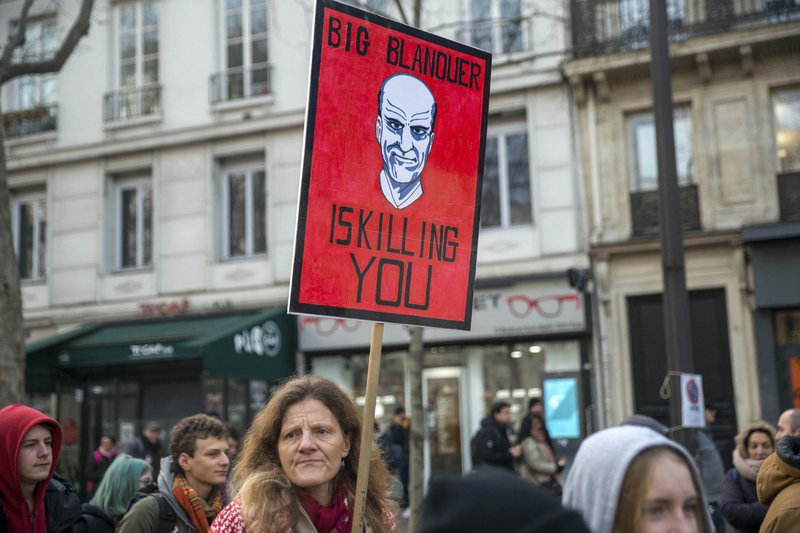Yves here. The limited media reporting on protests in France over pension “reform” depicts Macron as having won by outlasting the opposition. This account indicates that while some players, like certain union leaders, have surrendered, the rank and file, as well as other interests, are carrying on. I’m not in a position to validate whether the fight over pensions is still in play, but this piece does have a lot of detail on the history and recent developments.
By Touraj Eghtesad, a French-Iranian teacher of History, Geography and Civic Education in Strasbourg (France). Formerly employed at the Vrije Universiteit Amsterdam, he is an anthropologist specialised in education, social movements and youth. Originally published at openDemocracy
Last October, I first started to get wind of a strike against Macron’s pension reform. As I am under 30, I didn’t think twice about it. I had yet to discover that this unprecedented call to strike is the clearest example to date of the changing nature of workers’ movements in France. Some call the shift a giletjaune-isation, because it comes from the bottom. A local assembly of trade unions at the RATP (Paris’ transport agency owned by the state) decided to strike on December 5. The strike was announced two months in advance and quickly rallied the railway workers. It has now lasted over 50 days. As I write, the strike is ongoing but has failed to produce concrete results, despite the very new modalities of action which express such profound human creativity and solidarity.
Tensions have been extremely high since December 5, most notably in the first couple of weeks. On a couple of occasions, the Paris metro has been shut down and half of the trains in the country were not functioning. Companies have promoted working from home and university exams were either delayed for a month or even cancelled. The government and the “reformist” unions (centrists like the CFDT and UNSA) called for a truce during the Christmas holidays, which the workers in the major transport companies disobeyed. Both of those unions have since shown support for the reform, leading to a disconnect between their base and their leaders. Many have continued to strike and protest, while others have symbolically ripped up their membership cards and left the CFDT. The remainder of the unions, the Gilets Jaunes and individual citizens have called for a complete withdrawal of the pensions reform.
The Pensions Reform
The government had originally planned to present the pensions reform in 2019, but had to postpone this because of the Gilets Jaunes uprising. Since then, all that was known was that there would be a point-based system, which Belgium had rejected after mounting a large protest movement of its own. As the right-wing presidential candidate François Fillon famously told business owners in 2017, the only advantage of a point-based system is that it is easy to reduce pensions. Macron’s campaign promise concerning pensions was that he would create a universal pension scheme instead of the many schemes for different professions.
The government insists the reform is about justice between different pension plans. They will be calculated based on one’s entire career, whereas it is currently the 25 best years in the private sector and the last six months of your career in the public sector where wages rise over time which are accounted for. Soon after the movement began in December, the government withdrew plans to change the pension scheme for stewards, police officers and the military to avoid trouble in key sectors.
In all the precipitation and mishaps around the law, one thing has become apparent: there is little logic behind such a major law, as was expressed by the Conseil d’Etat (highest administrative court) last week. It will open a market of 320 billion euros for private pension funds, in which people will have to invest to live decently through retirement. One of the major targets of the law’s opponents is Blackrock, the famous American hedge fund, whose president of French operations received the Légion d’honneur, the French equivalent of a knighthood. Jean-Paul Delevoye, the minister in charge of the pensions reform, was pushed to quit once the public became aware of his multiple jobs including conflicts of interest regarding his involvement with insurance companies. So far, this has been the only true concession to the law’s opponents.

Those mobilised are extremely determined for the whole law to be withdrawn. There is too much to lose for many professions: lawyers and chiropractors might no longer make enough to run their own independent offices, public sector workers will lose between 300 and 1000 euros a month, the pension system will be emptied of billions of euros from its wealthiest contributors (above 10, 000 euros per month) and all will have to work longer (up to 64 instead of 62 currently). Pensions have been capped at 14% of the GDP and with rising numbers of retirees, individual pensions will be reduced.
A Radical Protest
But this protest movement is about so much more than pensions: it is a struggle against neoliberalism and Macron’s authoritarianism, although this is not explicit in terms of demands. Some people feel like a defeat in this struggle will make it difficult to mobilise in the future considering the momentum we currently have. Workers have been mobilised in many different sectors over the past two and a half years and their frustrations are intensifying. Macron has a 25% approval rating and while the wealthy have made record profits since he became president, over a million people have gone below the poverty line.
While the wealthy have made record profits since he became president, over a million people have gone below the poverty line.
It seems like power is hanging by a thread although the government shows no sign of compromise, with local elections approaching in March. The police have been heavily mobilised and have begun in recent days to repress some protests violently. Many unionists have had disciplinary measures taken against them, either by their employer or in court. Macron recently stated that if people think France is a dictatorship, he wished them to go live in a real dictatorship and see what it’s like.
It is refreshing and motivating to feel the solidarity in the air over the past couple of months. Over 1.5 million people protested on December 5 and 17 and there has consistently been 500, 000 people on other days of cheerful protesting. Some energy sector workers have distributed free electricity to those who cannot pay their bill. Tens of thousands of people have contributed to various strike funds, with one of them famously reaching the symbolic 1 million euro mark. In my hometown of Strasbourg, the atmosphere has been very peaceful and positive despite there being few signs of victory. People seem to have faith in the determination of their friends and colleagues.
While some people boast about the strike and protests lasting too long or being useless, over 60% of French people support the strike according to most polls. Strikers have it difficult at times: some people made 0 euros last month. Yet the strike is still strong but many have realised that modalities of action need to change for the movement to continue to build.
Diverse and Creative Actions
While the mainstream French media reports have been reporting for some time that the strike is dying down or becoming violent, the nature of the movement just seems to be changing.
Several new sectors officially entered the battle in the past two weeks: university lecturers, lawyers, dockers, certain pilots and others. Strikes now focus on specific days and more creative actions are employed to gain visibility. For example, a weekly torch protest has begun on Thursday nights, adding a certain warmth and beauty to marches. The movement is intensifying, with more small-scale sectoral actions and shockupations. These occupations that last a couple of minutes or hours have taken over government buildings, the CFDT office, shopping malls, public squares, etc. This is often interpreted as violence by government officials, who have been overly represented on television the past couple of days, and television editorialists who sacralise private property and often lack nuanced analyses.

The strikers have been a great inspiration and every protest is a moment of reassurance which helps activists give meaning to their action. On strike days, the protest atmosphere has been much livelier than usual. Bridges are being built between experienced activists and newcomers from different sectors. All over France, feminists from the anti-globalization organisation ATTAC have put on their work overalls, performed choreographies and sang parodies of famous pop songs. LGBTQI+ activists have been quite visible in Strasbourg’s protests and have been very vocal with chants emphasising the anti-feminist nature of Macron’s reform. Students have brought plastic gasoline cans to use as drums. Archeologists and certain doctoral students have come dressed up in historical costume. Railway workers have been exploding air cannons and some in public works running electric chainsaws. Scarecrows and signs have been made to parody ministers and their reforms with great humour.
Theatrics and sabotage have also been employed on work days or minor strike days. Firefighters have staged “die-ins’, in front of emblematic places such as courthouses. In Strasbourg, hundreds of them lay down on the floor and let off smoke bombs. Workers at France’s public radio sang the Chorus of the Hebrew Slaves by Verdi to interrupt their director in the midst of a redundancy plan. Lawyers threw their gowns on the floor in front of the Justice Minister during her conference. Doctors then threw their scrubs on the floor and 1000 of them resigned from all administrative tasks in a letter to the Health Minister. Teachers threw backpacks, notebooks and chalk at certain schools and administrative buildings. The Opera of Paris performed a ballet in the street and have been on strike for over 6 weeks. President Macron had to be extracted from a theatre one night after a tip from a journalist on Twitter brought protestors to the door, which reminded observers of the tensions at the height of the Gilets Jaunes movement.
We are witnessing a real convergence of struggles as local groups show solidarity by turning up at each others’ mobilisations. While all do not go on strike at once, people have been taking turns striking and reinforcements have joined the struggle. As a teacher, I would like to explain the relationship of developments in education to pensions reform.

Like other ministers and the president who present this reform not as an austerity measure but a “measure for justice”, the minister of Education Jean-Michel Blanquer has been spreading a lot of rumours. Last week, he suggested that only the 0.1% of teachers who are “radicalised” disagreed with him, in the midst of major opposition to a botched A-Level (Baccalauréat) reform. I wasn’t really surprised to see teachers massively present at the first major protest after that (January 24).
Many teachers who were not at previous protests joined the 5000 or so in Strasbourg. This week, teachers will be dressed in black to celebrate the Baccalauréat’s funeral and to target specific schools. High school teachers have massively begun to strike in the past week and are being replaced by volunteers, jeopardising the right to strike. An 83 year old volunteer fell and was injured last week.
The minister keeps insisting that teachers will not lose out with the pensions reform because their salaries will rise accordingly. Nonetheless, teachers will have to work till they are up to 64 years old, only to have a 1000-1200 euros pension and wages will rise very little. 500 million euros were unlocked for a pay rise in 2021 which will amount to 40 to 90 euros per month, with an emphasis on young professors’ salaries. Constitutional experts suggest that this addition will automatically have to be withdrawn because it is unconstitutional. For teachers who have spent years giving their all for students, these pay rises amount to little more than a communication tactic while pensions fall. Many young teachers feel like they will die before retiring, considering the stress at work (c.f. The sign that takes the famous rhyming expression “underground, workday, sleep”and replaces it with “underground, workday, grave”).
Working conditions are getting tougher each year with larger classes (often 30 students in middle school classes and 40 in high school) due to budget cuts and an inability to recruit new teachers. Widespread attention problems are developing among students and teachers in difficult contexts. They lack support in the face of violence and in addressing learning disorders. Projects that could help to innovate to takle all these issues are simply not being undertaken. Inequality is rising among students and there seems to be an inability to rethink the education system, just like there is an inability to rethink society itself in the age of neoliberalism.
What’s Next?
Unions have been declining over the past 25 years, with a reduction of membership and major losses over labour and pensions reforms. The current movement is the largest since 1995, when the government had to withdraw a similar pensions bill. It is the longest strike in French history, surpassing the 6-week general strike in May 1968. Things could still go either way, as the government has failed to convince the public and refuses to negotiate or give in, as would have been the case in previous governments after such a movement. The government is staking its reputation on its ability to go through with this reform and argues that it has negotiated a deal because private discussions have taken place with centrist unions. However, some companies (outside the financial sector) are starting to be exasperated by the disturbances to business and may also put pressure on the government.
What is certain is that society is polarised, although a majority supports the movement. Official discourse is starting to criminalise and demonise the movement, which remains peaceful despite police brutality steadily increasing. The government is facing difficulties justifying the reform and has therefore intensified its disinformation campaign.The magazine Le Point’s recent front page stated “How the CGT is ruining France”, while the historic CGT (communist trade union) and its leader Philippe Martinez, now seen as Macron’s number one opponent, is active in environmental, feminist and antiracist struggles. Discussions are now taking place with left-wing political parties, charities, collectives and are perhaps paving the way to a new political project for the country.
The future lies with the strikers at the base, who have shown absolute determination. Many are hopeful that the battle can be won and are willing to sacrifice further pay and time spent with family. In the midst of a cold winter, protestors are still out in very large numbers and the most determined have participated in many actions. The law went through the council of ministers on January 24 and will be discussed in parliament in the coming months although for the first time in history, a law has been filed with many holes yet to be filled in.
“The reform is universal, it is everywhere”
“Choose the blue pill and everything stops.
You go back to work, watch the 24 hour news network
And we all go down.
Then take the other pill
Which is actually the same!
Did you think you were in a movie?”

“Macron’s party starring in a reform proposed by the business owners’ union.
“… and for a little extra profit”
“Can’t you see, the world is divided in two categories: those who have loaded weapons, and those who dig. You dig.”

“How to destroy the public sector, for idiots”
The poster explains Chomsky’s theory on privatisation: first the service’s quality deteriorates with lack of funding, then it is privatised and profits are made.



Retiring can quite a shock, and these days some will need an adjustment period to find their feet.
It’s also useful to keep retirees on availability to facilitate transfer of knowledge and experience.
How about a gradual retirement process from 60–65, where the workweek days gradually decline:
61, 5 days a week, 0% of yearly pension
62, 4 days a week, 20% of yearly pension
63, 3 days a week, 40% of yearly pension
64, 2 days a week, 60% of yearly pension
65, 1 day a week, 80%of yearly pension
Your proposal appears remarkably difficult for an Employer to schedule.
It shouldn’t be. I worked in an office of 19 people with 1 on 10h, 3 on 20h, 1 on 35h and an older guy on 32h. And since an average german office worker does only 2 hours of actual work a day anyway… :P
Of course an equal Citizen’s Dividend to replace ALL fiat creation beyond that created by deficit spending for the general welfare would go to pensioners too.
And de-privileging the banks would be massively deflationary by itself and thus allow a large initial Citizen’s Dividend during the de-privilging period* to counter that deflation.
Isn’t it time to abolish ALL relics of the infamous, inherently corrupt Gold Standard? Before they abolish a great many of us?
*Since the abolition of deposit guarantees, for example, should be done in stages to avoid financial chaos.
Hear tell, some of those ‘French’ policemen have actually been trucked in from foreign countries, a bit like King George’s Hessians in colonial America.
It’s very good to hear about what’s happening on the ground in France, since the media blackout of the yellow jackets has been extraordinary.
Thats why I watch BBC World instead of American corporate media. They have had a lot of coverage of this. If you want to see more world news and even American news not on American outlets, I suggest you try BBC World.
I’m want to comment on this more if I can find time tomorrow. The state of things right now is mostly resignation and thinking that this will be the end of Macron, not now but when he’s replaced by Marine Le Pen. He is paying no attention to the price he’ll pay for such arrogant behavior.
Please do so. We have a tweet in Links, just a short video, but pretty telling.
If Blackrock really believes in the intrinsic value of currency, like the gold standard, then BR should stand on its own two sandy feet and invest on the exogenous peg of currencies going exponential. (That’s not gonna happen because even BR knows it’s a lie.) The fact that Blackrock is trying to insinuate itself, and not so subtly, into the social security fund is telling. It was doing the same thing here – it had a scheme along with her majesty Hillary, to take at least 3% and invest it for us deplorables. So we could have sufficient retirement. Right. Blackrock can’t possibly predicts the future based on a failed ideology. It can try to step in and direct traffic but that’s about it. It will fail. I’d hang a big sign that said simply Get Out Blackrock.
I posted a long comment on this situation a couple of days ago, and I won’t try the patience of fellow-NCers by repeating it all now .The thing to understand is that there’s a short term and a long term.
In the short term the strikes are fizzling out. Public transport in Paris today was effectively normal. This is largely because the strikers assumed that the government was playing by the traditional rules, as they were, and that big enough demonstrations would finally force the government to back down, as has happened before on this question, most notably in 1995. But the politics of the street (and the Opera for that matter) no longer function because the government doesn’t really understand ordinary people and isn’t making the effort to try. It broadcasts technocratic arrogance daily. Moreover, the unions are deeply divided, private sector workers have not joined in, and teachers, for example, are now largely back at work.
In the short term, Macron has probably won. But it’s the long term he should be worried about. What you’re getting is spontaneous guerilla actions here there and everywhere, some of them violent. Public feeling is still running high, but the attempts to organise it – strikes, demonstrations and so forth – haven’t worked against a government which is blind and deaf. Almost anything could now happen, but probably slowly, piecemeal and in an uncoordinated fashion. The forces of public order are overstretched, exhausted and will not be able to cope. Which brings us to 2022 and the next Presidential election. Le Pen has already thrown her helmet into the ring, and it currently seems very likely that there will be a Macron-Le Pen second round. This time, though, it’s not clear that the French people will turn out to keep Le Pen away from the Elysée. If Macron were more intelligent he’d be worried about that.
The stupid thing is that the French pension system does need modernising. The points system, which applies in certain regimes already, generally works well. But trust Macron and his bunch of arrogant technocratic know-nothings to screw things up and create a political crisis in the process.
It seems to me David is pretty much correct in his description. From my viewpoint in central (“Flyover”) France, Nevers, the only newspaper locally published is the “Journal Du Centre”, which is pretty conservative, and offers us little in the way of insight into those who continue to strike. A dedication to “order at all costs” has always been typical of those who see themselves as members of the aristocracy (or would like to be), and the local media does not rock the boat.
Major cities seem to be the real centers of resistance, and in my medium-size town, students, mostly what Americans would consider High School age, have few resources to sustain resistance, but much enthusiasm. Nevertheless, the teachers and railway workers here have done their best, while the general populace seems to be just hoping it will all go away.
It will not.
It’s premature to say Macron has won. Professionals such as lawyers are beginning to locally participate, and offer a flavor of legitimacy that even the much-abused teachers cannot bring, and may help to ease the effects of much media contempt and economic hand-wringing of the sort that worries the isolated populations here in abandoned France.
The most striking thing I see is that after living in Paris for fifteen years and Nevers for seven, one marvels at the discontinuity between the aristocratic view of common workers- Hillary’s French “Deplorables”- and the plain, unmistakable reality of the deteriorating quality of life on the assembly line or maintenance crew. This process is not going to stop under the policy prescriptions of a deeply neoliberal ruling clique, with a pretty but merciless puppet as flac catcher.
In my opinion, of all the countries in Western Europe, France is the best positioned to support itself in most respects should the need arise, and with rational leadership. It is easy to see why Le Pen’s ilk appeal to a region that sees itself as a dumping ground for immigrants who show little desire to truly integrate themselves into France or adopt the traditions so precious to those who live here.
In my years in Paris (not France) and in Nevers, it has become clear that anyone who sees Paris as representing the real France is going to misunderstand much.
If the deplorables like myself in central France ever get truly mobilized, Macron is done that week. What will replace him is another question.
Thank you for this overview of what’s happening in France.
Thanks for this post. I have the impression the strikes combined with Macron’s indifference has become of a kind of siege warfare where each side is trying to siege or out last the other, instead of negotiating. An exercise in raw power, who is in control, is control absolute and used autocratically or democratically? It’s astonishing how indifferent Macron appears to so many voters/citizens striking for months.
Les citoyens contre le roi soleil?
You’re right. It’s Macon’s obvious indifference as well as the blatant unfairness, even illogicality of the policy prescriptions he is given to represent that truly galls the most.
The former head of MI6 saw problems ahead in 2016:
“Sir Richard Dearlove warned the continent is facing a “populist uprising” amid growing anger from voters who feel they have been betrayed by political elites in London, Paris, Berlin and Brussels.”
“Just plough on, it may never happen” the neoliberals
The New Deal was able to put in radical reforms because they were coupled with investigations and prosecutions of fraud, introduction of the wealth tax in 1935 and an increase in income tax in 1937 as well as introducing payroll taxes.
The past 35 years have been focused on “reform” for the poor and middle class and tax cuts for the wealthy. Events like the financial crisis in 2008 don’t even get a sideways glance from prosecutors in the US who are too busy locking up poor people for marijuana possession and parking tickets. They have been able to get away with this by focusing on creating division in the ranks, especially using racist tropes. However, it appears that the French lower and middle class are starting to coalesce and focusing on their true interests.
I will note that many of these systems likely could use reform to provide long-term stability and evening out of benefits. Unless there is control over the last 6 months of pay, then there is huge opportunity for individuals to game that system. However, people need to be convinced that is in their best interest and right now they are more convinced the elite are using it as an excuse to screw them.
The French are different, and that probably comes from their history and the revolution.
In the UK, we have often heard about their protests in the past, and they don’t take any nonsense.
In the past, it did seem like they were going a bit far, but now we need people that just won’t take things lying down, like the French.
The word reform usually means screw the average worker. This is probably the case here. Unions in Europe still have a lot of power and aren’t afraid to use it. I can’t imagine a US union doing what the French unions are doing. In Europe when a union goes on strike, other unions support them in a show of solidarity. This doesn’t happen in the US. In the US private pensions were destroyed by neoliberalism. At 79 with a defined benefit pension alone with SS I’m economically in relatively good shape. I worry about the future that younger people face. Many are not able to save for their retirement. SS as it now is isn’t enough. What will happen to them when they get old? In the future our country is set up for a big economic disaster when we have the majority of old people living in poverty.
Thanks for sharing my article! I think I’m going to post another one in OpenDemocracy in about six weeks about round 2 of the struggle. Lawyers and university workers are the only ones still pretty active, everywhere else the movement is on standby. In the meantime, we’ve got local elections coming up and the law going through parliament in a theatrical manner.
Thanks for the show of support everyone!